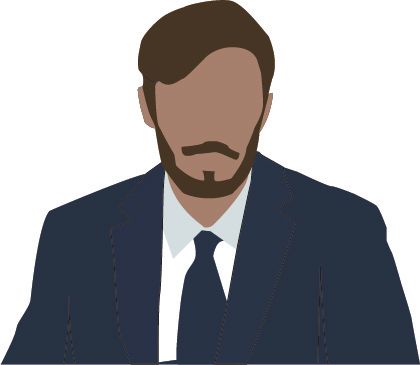“Her philosophy is carpe diem for herself and laissez-faire for others.”
- F. Scott Fitzgerald, This Side of Paradise
If society was a body it would have politics as its brain and economy as its heart. That would make industry and finance the digestive and circulatory systems respectively. The nervous system would be the people, making it all work. Where would morality fit in this ecosystem? Would it still be that itch in the back of our heads, much like it is on our own bodies? Morality cannot reside alone in politics, as it leaves the economy unchecked. Likewise, it cannot function only on economic value without tending to its decisions. The only viable solution is for morality to reside in the nervous system and to make the whole body function.
Adam Smith’s invisible hand is a beautifully misguided dream that sees the economy as self-moral. The economy regulates itself for the good of the people through the laws of supply and demand. Adam Smith’s invisible hand is also an excellent scapegoat for immoral profiteering by greedy individuals. It is not the greedy man’s fault that there is not enough money to go around. To understand morality in society one must first understand that the major opponent to morality is greed.
There are evil men doing evil things. Nero can burn a city if he likes (or not, according to some historians). Stalin can imprison the man who stops clapping first. Hitler can persecute and try to exterminate an entire race. It is true that the foulest of deeds have been committed by men with evil intentions, but was it not fortunate that the burning of Rome made space for Nero’s brand new palace? Is it not useful that once you imprison and torture the man who stops clapping first, all the others clap until their arms fall off? And is it not easier to blame social, political and economic failures on an outside race? Evil deeds are usually committed for a reason. That reason can be built out of genuine evil belief but it seems eerie that there is always some gain on the actionable side.
Greed makes immoral choices feel reasonable. It’s a simple trade: us for them - winners and losers. And that is why it is unacceptable that the economic system that pumps blood into our society is a winner-takes-all, natural selection paradiso. Capitalism is giving credibility and basis to an unequal prowling ground where survival of the fittest is the only answer. Still, morality resides in the nervous system, remember? People are the ones who make good and bad decisions.
Enter Christian Democracy. Konrad Adenauer saw the value in a society free to make its choices as long as it was structured by Christian moral principles such as ‘do unto others as you would have them do unto you’. It seems like a good idea at first, but Christian ideology does have some unfortunate views about same-sex marriage, women’s rights and even racial equality. Social causes can’t progress much under societies that are conservative about morality and slow to adapt to new social realities. Furthermore, the proclamation of a ‘Christian’ morality immediately alienates other religious and spiritual beliefs, hurting the concept of a secular society.
As for neoliberal claims to morality, well, they have none. They flat out reject the interference of morality in business. They reject any interference in business. Neoliberal policies and attitudes are moral monstrosities that show total and complete disregard for the social and political parts of society in an attempt to put greed above all else. Ayn Rand’s ethical egoism is a self-professed denial of morality and is ridiculously dismissed by pointing at any economic crisis from 1929 to 2008. Her defence of the virtue of selfishness is a blatant acceptance of a corrupt morality.
Ethical egoism is not only morally corrupt, it is also irrational in a social environment. Humans are social creatures by nature, there is no way around that. We are not the lone wolves but the pack. I’m sure everyone has dreamt of following Thoreau’s footsteps and settling in a cabin in 19th century Walden pond alone, but the argument that human beings work as individual units is unjustifiable and seems more like a cheap excuse for greed. Game theory and Nash’s equilibrium have proven that ethical egoism cannot work in a community, and that in fact the best option is either ethical altruism or ethical utilitarianism. So capitalist and neoliberal policies are mathematically proven to be a toxic presence in society.
Rand suggests that the only moral purpose of a person’s life is their own happiness, which seems to ultimately ignore the concept of morality. Any actual concept of morality goes beyond the self. Kant’s good will operates mostly in a social environment, and even if moral actions don’t involve other human beings per se, they still relate to action towards the world. Utilitarianism as an ethical philosophy also works in a social environment. There is no philosophical paradigm in which our own happiness functions in any way as a moral compass. Therefore, Rand’s premise seems to be a shaky excuse for greed and individualistic action.This socio-economic carpe diem laissez-faire excuse for a political philosophy is just an attempt at undermining morality’s role in a society where people depend on one another. The American dream is dead but neoliberals keep stabbing at the corpse, while claiming they can bring it back to life. The only way to build a sustainable society is through moral and sensible political action. People cannot be thought of as only individuals in a society, but as part of a collective, a single working organism where the chain is only as strong as its weakest link.
Photo by David Vives from Pexels
Special thanks for our patrons, Dominic Condello, John Walker, BoringAsian, Mr Jake P Walker, Joseph Sharples, Josh Stead
If you want to help us reach the funds needed to keep this site up forever, please consider becoming a patron:





